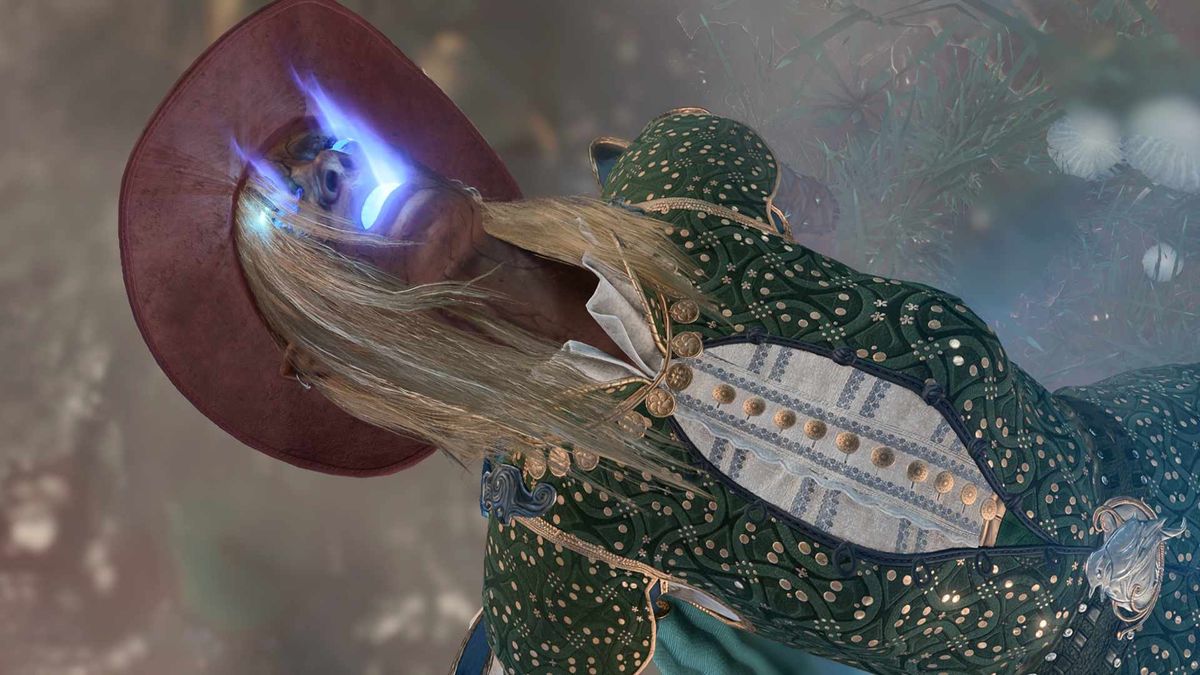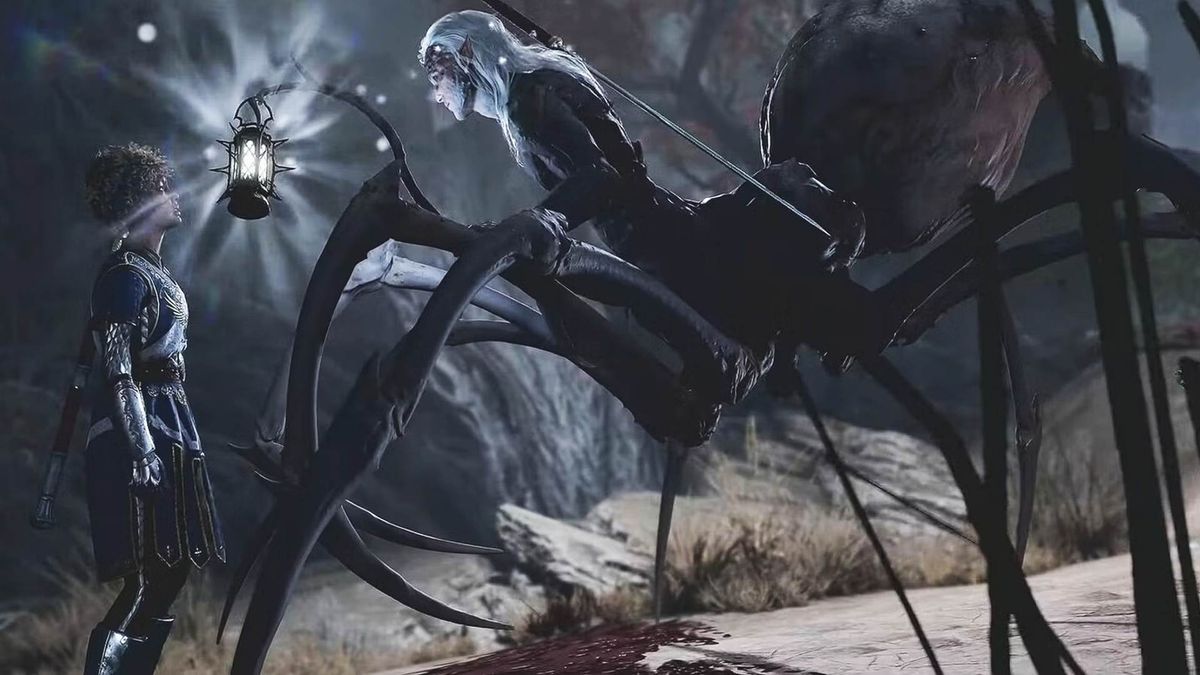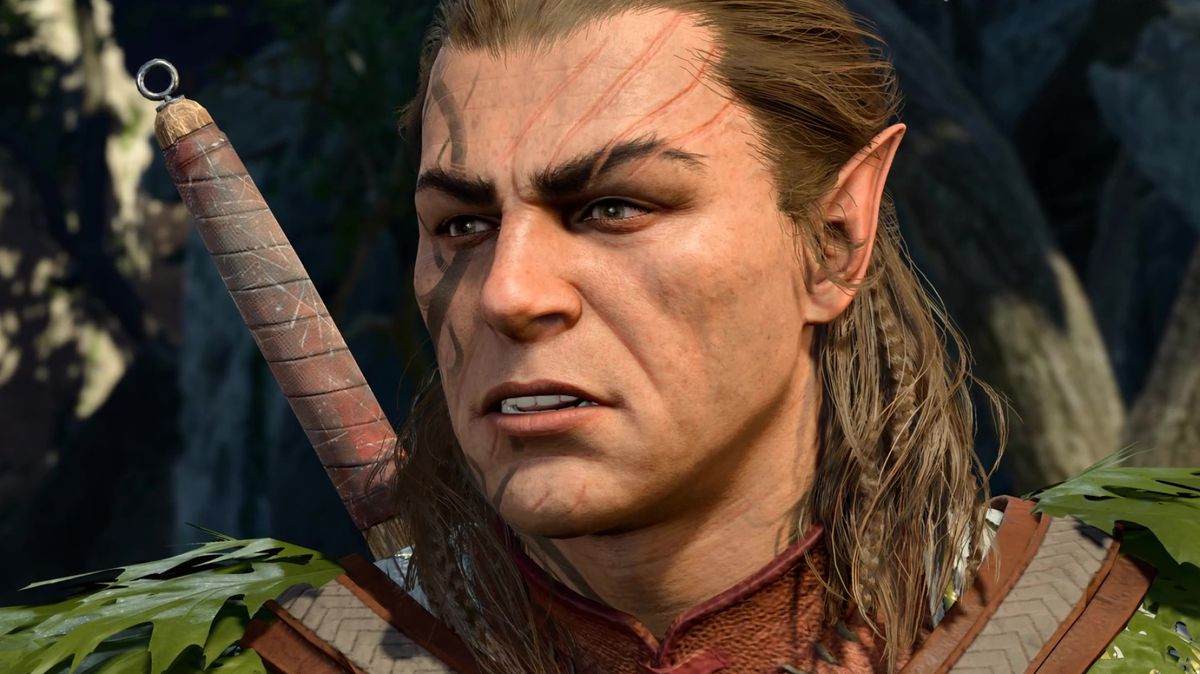It’s hard to overstate the spectacle of Baldur’s Gate 3. It’s hard to escape it, too. Baldur’s Gate 3 is all over the internet like its players are all over bears. Larian’s latest epic RPG is well and truly having a moment, and through it, CRPGs in general are too. It’s amazing to see such an enduring but somehow-still-niche genre receive this kind of widespread love. Nowhere in my crystal ball did I foresee an Elden Ring-grade reception for this thing, and it seems Larian didn’t either. This makes it especially annoying to see people sour the mood with strawman criticisms that lead to nowhere.
Baldur’s Gate 3’s viral launch is simultaneously the most and least surprising development of the year. CRPGs are far from dead, even if we really don’t get that many of them anymore, but they’ve never enjoyed success like this. But it’s also not like this is an out-of-nowhere indie hit like Dave the Diver or Vampire Survivors. It’s Baldur’s Gate! It’s D&D! It’s Larian! It’s the RPG based on the RPG. Of course lots of people are going to like it. They already like the things it helped inspire – like Elden Ring!
This is not news, but it’s worth remembering that you could not count the video games shaped by D&D. The best RPGs you can think of are mere rivers off the D&D headwater, and Baldur’s Gate 3 takes us as close to the source as we can get without a kitchen table and a couple of friends. It’s an irresistible shot of possibilities that worms its way into your imagination like a toothy Mind Flayer tadpole squirming toward your brain. It’s a miracle game 23 years in the making, six years in development, and fresh out of three years of Early Access. And it is far, far too special to be reduced to a moral bludgeon to beat other games and studios with.
Roll for Perception

For reasons I cannot fathom, a recurring narrative amidst Baldur’s Gate 3’s launch has been some rendition of the following gobbledygook: the market was starved for good, mostly bug-free single-player games with no, or at least non-invasive microtransactions, and Baldur’s Gate 3 has set a new standard for RPGs by proving just how easy it is to make a good game and find unimaginable success because you made a good game.
Folks, some of y’all have failed a Perception check. You could wring this narrative over a funnel and not collect a drop of truth.
Firstly, games are really good right now! Most of the best games of 2023 are exactly what’s been described here, and if you’re struggling to find what you like, I implore you to take two steps outside not just the tiny AAA bubble, but the even tinier AAA live service bubble. Let’s also talk about success for a minute. The games industry is no stranger to what we’ll charitably call uninformed suggestions, but the idea that ‘all you have to do is make a good game,’ and that that’s all Larian did with Baldur’s Gate 3, is so willfully ignorant that I can’t let it escape unchallenged. I wasn’t being hyperbolic when I said Baldur’s Gate 3 is a miracle. It’s the result of moonshot circumstances assembled with immeasurable luck and hard work by people who worked hard to get in a position where they could get this lucky.

Baldur’s Gate 3 had the license, backing, talent, technology, freedom, timeline, and many other resources and advantages helpfully outlined by Strange Scaffold boss Xalavier Nelson Jr., and echoed by countless other game developers like Obsidian lead Josh Sawyer. By the way, ask Sawyer why it’s not always enough to make a great CRPG, even for an established RPG powerhouse.
Baldur’s Gate 3 is also testament to the value of retaining talent and getting really good at one specific thing. The delicious irony here is that the other staggeringly massive and inventive open-world games that people often point to in this argument, like Elden Ring and The Legend of Zelda: Tears of the Kingdom, were born of similar circumstances.
FromSoftware has held onto its people and gotten really good at its type of game, to the point that a composer leaving the studio after 12 years was heart-drop news, and Elden Ring is the resulting masterwork. You cannot make that game without that experience – without people with that experience. Likewise, Tears of the Kingdom was explicitly built on the technical and design foundations of Breath of the Wild, a system-selling success. And the enormous company that is Nintendo is also known for holding onto designers for years and years to cultivate talent.
What new standard?

Despite what you may have heard from sensationalists trading in outrage and uninformed suggestions, pointing this out is not at all the same as attacking or belittling Baldur’s Gate 3 or these other games, nor is it about making excuses. I don’t want to understand the kind of hateful mental gymnastics it takes to hear ‘this situation is extremely rare’ and interpret it as ‘game developers want to lower the standard of games.’ Recognizing and unpicking how these titanic releases came to be could, if anything, help set future games up for similar success – or even a fraction of the same success, which would still be amazing.
The maddening part of this argument is that it’s so self-defeating. Baldur’s Gate 3 is what it is precisely because it is not Larian’s first game. It could never be any studio’s first CRPG or first game, and this is not limited to three indie devs working out of a garage. Any team attempting a project of this scale would have to learn to walk first, but the people banging on about this ‘new standard for RPGs’ would break their legs before they could learn to run because that team couldn’t make Baldur’s Gate 3 from the get-go. Just as I, a perfectly functional and well-adjusted adult, will go to my favorite Japanese steakhouse for a luxury meal and immediately call my local casual diner to berate their homey menu. Sorry, bud, there’s a new standard in town.
It’s absurd to insist that this kind of examination is an insult to Larian, and in the same breath incredulously ask why bigger studios don’t just go out and make games like this. Just as making a good game does not guarantee success, bags of money do not guarantee a good game because it’s actually people, you’ll find, that make games. Baldur’s Gate 3 didn’t materialize after 400 people gathered together to be passionate for six years. It was painstakingly made by highly specialized designers and programmers and artists and out-of-their-fucking-mind writers who you can’t just find under a rock. Larian is far from the only studio capable of this – as I said before, we have gotten some great, Baldur-less CRPGs in the past 23 years – but not every team can make the RPG based on the RPG. Not every team wants to!
Baldur’s fate

More than anything, I don’t understand where this came from. I realize that some people feel compelled to pit projects against each other, but this is such an arbitrary war to wage, and it’s a reductive way to weaponize an exciting moment. Does every open-world game have to be Elden Ring or Tears of the Kingdom? Must every gacha game be Genshin Impact, every roguelike a Hades, every platformer a Super Mario Odyssey? Can I not enjoy Microvanias because more ambitious Metroidvanias exist? Are RPGs like Final Fantasy 16 suddenly bad because they aren’t as branching or reactive as Baldur’s Gate 3? Of course not. So what are we doing here? I thought we hate it when people measure entire genres against the same game, like JRPGs to Persona 5, the game that invented jazz and also Japan.
The takeaway from Baldur’s Gate 3’s success should not be ‘it’s this way or the highway.’ That is quite possibly the least productive thing you could say. I can tell you what I want people to take from this. Because I do think big games need to change, and I hope Baldur’s Gate 3 moves the needle. I hope this pops the cork on a new bottle of CRPGs that clearly have a big and eager audience, and I hope that audience sticks around. I hope RPGs invest more in the character animations we actually stare at and less into excessively detailed or enormous environments. I hope future games of all kinds feel encouraged to be comically weird but not obnoxious, and utterly, gutturally horny but not crass. I hope Baldur’s Gate 3 in some way contributes to better-managed Early Access roadmaps. I hope to see smaller open worlds with more stuff in them.
The best thing to do is to just kick back and enjoy these moments where the stars aligned. We will never get games like this all the time, if only because they take forever to make even in near-ideal circumstances. You’re only setting yourself up for needless disappointment, and making it harder for anyone to create anything, by asking everything else to match them. Baldur’s Gate 3 represents the ceiling of RPGs, not some new floor. I have no doubt that CRPGs, and hopefully RPGs altogether, will in some way be bettered by Baldur’s Gate 3’s many achievements. But you should like things because you like them, not because they are deemed revolutionary or empirically great, and smaller, different games can and will and should be good in smaller, different ways.
<div
 Games News games, movies and TV you love.
Games News games, movies and TV you love.



